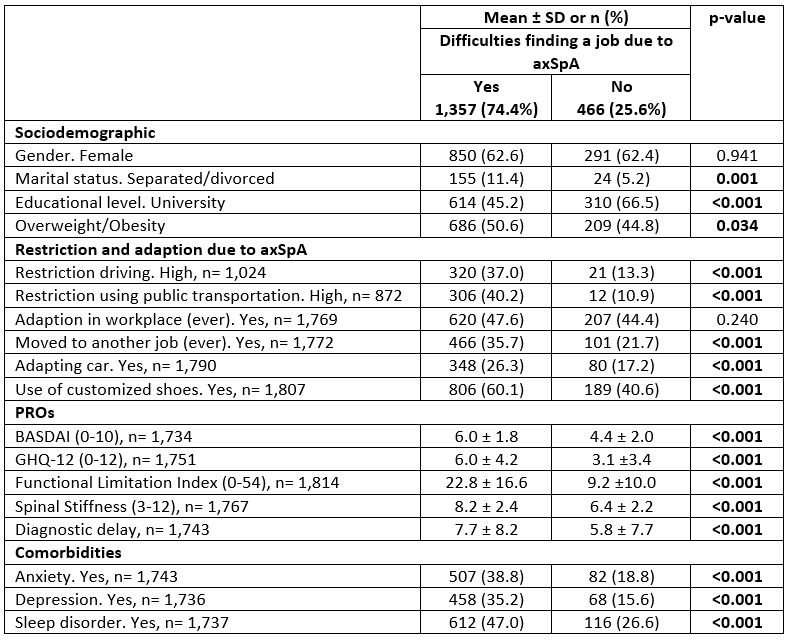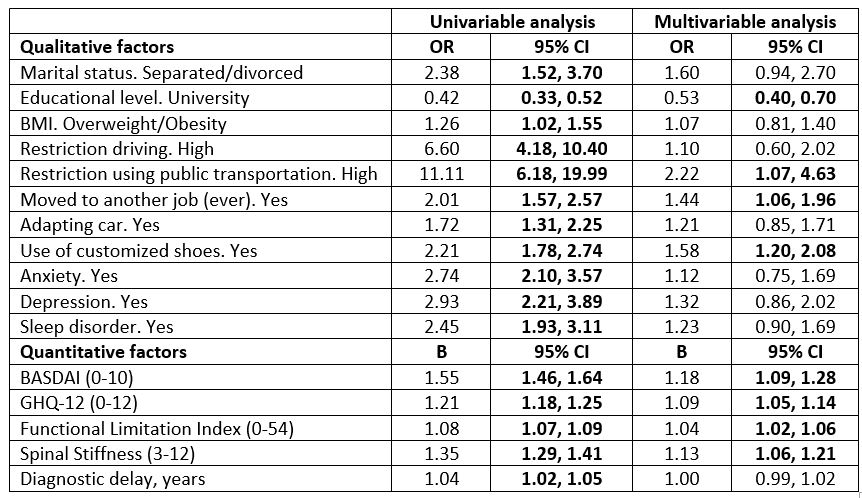Session Information
Session Type: Poster Session A
Session Time: 8:30AM-10:30AM
Background/Purpose: AxSpA is associated with substantial negative consequences regarding work status and career prospects. The aim is to identify factors associated with barriers to job access among European axSpA patients.
Methods: Data from 2,846 unselected patients participating in EMAS, an online survey (2017-2018) across 13 European countries, were analyzed. Difficulties in finding a job was assessed by the following item: “Do you think it is or it would be difficult for you to find a job because of your Spondylitis/Spondyloarthritis? (Yes/No)”. Differences in sociodemographic factors, patient-reported outcomes [BASDAI (0-10), spinal stiffness (3-12), functional limitation (0-54), and mental health status using the 12-item General Health Questionnaire (0-12)], employment, lifestyle habits, and comorbidities were assessed through Mann-Whitney and χ2 tests. Univariable and multivariable binary logistic regression were used to identify variables possibly explaining difficulties/perceived difficulties finding a job due to axSpA.
Results: Among the 1,823 patients who responded to difficulties/perceived difficulties in finding a job due to axSpA, mean age was 41.4±10.7 years, 62.6% female, 50.7% had a university degree, and 65.6% were married. 56.8% were employed, 8.4% unemployed, and 28.2% on sick leave. 1,357 (74.4%) reported they had or would have difficulties finding a job. Compared to those without difficulties, patients with difficulties were typically separated/divorced (11.4% vs 5.2%, p=0.001), less university educated (45.2% vs 66.5%, p< 0.001), and overweight/obese (50.6% vs 44.8%, p=0.034). Those with difficulties had increased restrictions when driving (37.0% vs 13.3%), or when using public transportation (40.2% vs 10.9%), had previously changed jobs because of axSpA (35.7% vs 21.7%), required adaptions to their car (26.3% vs 17.2%) or shoes (60.1% vs 40.6%), had longer diagnostic delay (7.7 vs 5.8 years), higher disease activity (BASDAI 6.0 vs 4.4), poorer mental health through GHQ-12 (6.0 vs 3.1), greater functional limitation (22.8 vs 9.2), and spinal stiffness (8.2 vs 6.4), as well as higher rates of anxiety (38.8% vs 18.8%), depression (35.2% vs 15.6%), and sleep disorders (47.0% vs 26.6%, all p< 0.001). In the logistic regression analysis, the qualitative factors associated with difficulties finding a job were restrictions using public transportation (OR=2.22), use of customized shoes (OR=1.58), not having university education (OR=0.53) and having had previously changed jobs due to barriers created by axSpA (OR=1.44). The quantitative factors associated were disease activity (OR=1.18), spinal stiffness (OR=1.13), poorer mental health (OR=1.09), and functional limitation (OR=1.04).
Conclusion: Three out of four axSpA patients had, or perceived they would have, difficulties in finding a job. Poor physical and mental health, together with the need for mobility adaptations, lower educational level, having changed job due to axSpA were factors associated with difficulties/perceived difficulties in finding a job. Early diagnosis, effective treatment and greater advocacy in the workplace are needed to enable axSpA patients to search for and remain in employment.
To cite this abstract in AMA style:
Garrido-Cumbrera M, Navarro-Compán V, Bundy C, Makri S, Christen L, Correa-Fernández J, Sanz-Gomez S, Mahapatra R, Delgado-Domínguez C, Poddubnyy D. Why Is It so Difficult for AxSpA Patients to Find a Job? Results from the European Map of Axial Spondyloarthritis (EMAS) [abstract]. Arthritis Rheumatol. 2021; 73 (suppl 9). https://acrabstracts.org/abstract/why-is-it-so-difficult-for-axspa-patients-to-find-a-job-results-from-the-european-map-of-axial-spondyloarthritis-emas/. Accessed .« Back to ACR Convergence 2021
ACR Meeting Abstracts - https://acrabstracts.org/abstract/why-is-it-so-difficult-for-axspa-patients-to-find-a-job-results-from-the-european-map-of-axial-spondyloarthritis-emas/


